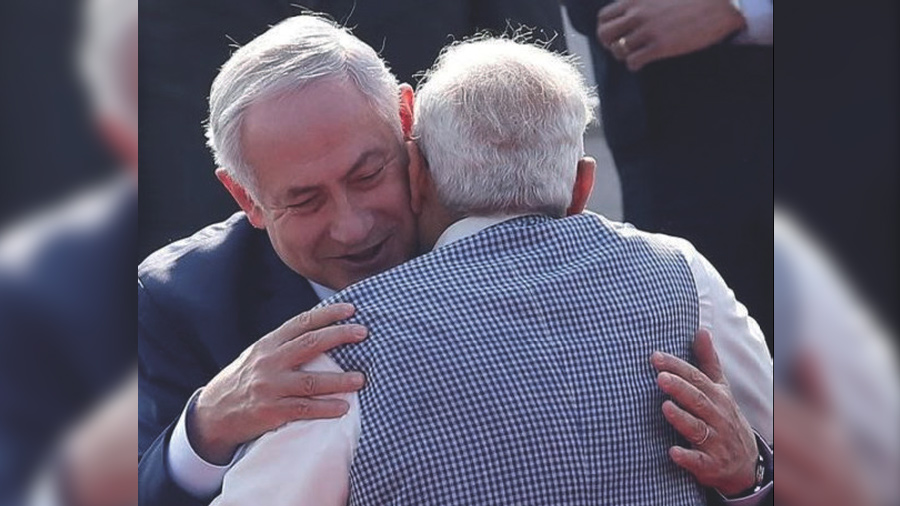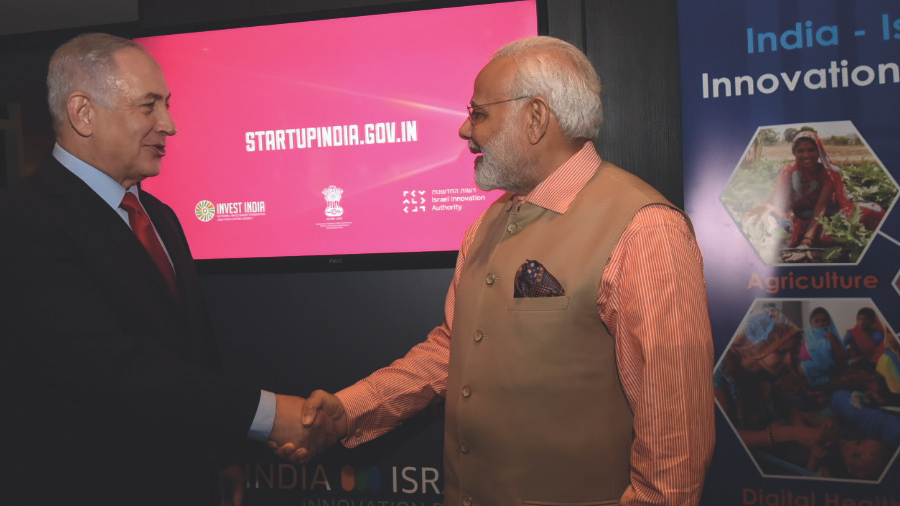The burgeoning relationship between India and Israel achieves an important new milestone with the visit to India in January by Israeli Prime Minister Benjamin Netanyahu. This is only the second official visit to India by a sitting Israeli prime minister since formal diplomatic relations were established in 1992. Netanyahu’s visit follows hard on the heels of Indian Prime Minister Narendra Modi’s visit to Israel in July 2017. That was a first, the first ever official visit to Israel by a sitting Indian prime minister.
The personal rapport between Natanyahu and Modi is without doubt one of the factors that has helped jumpstart the bilateral relationship which had fallen into the doldrums during the ten year rule by the Congress led United Progressive Alliance (UPA) government of Prime Minister Manmohan Singh and UPA chairperson Sonia Gandhi.
It’s important to recall that Modi began ramping up relations with Israel even before he became prime minister, during his time as chief minister of Gujarat from 2001 to 2014. When Modi took the Bharatiya Janata Party led National Democratic Alliance (NDA) to a landslide election victory in May 2014, Netanyahu was one of the first foreign leaders to congratulate him.
Growing Cooperation
It’s therefore perhaps fitting that Modi’s visit to Israel to meet Netanyahu was a first, an important visit which advanced the IndiaIsrael bilateral relationship along a number of tangible different fronts. Among other accomplishments, the two countries advanced their cooperation on agriculture and water management, in space and defence projects, cyber security, and strengthening people to people contacts among others. In tandem with the official visits, is a vibrant track to diplomacy in which I myself had the pleasure of participating on a visit to Israel in 2017 in advance of Modi’s visit.
In terms of what to look for during Netanyahu’s forthcoming visit to India to meet Modi, it is expected that the Israeli prime minister will meet Indian business leaders and promote cooperation on innovative technologies. Israel boasts some 500 startups, and 75 different companies are accompanying Netanyahu to India in the hopes of striking bilateral deals with their Indian counterparts. Apart from business dealings, there’s a symbolic and emotionally visit to the Chabad house, one of the targets of Pakistani led terrorists who attacked the city on November 26, 2008.
“Israel boasts some 500 startups, and 75 different companies are accompanying Netanyahu to India in the hopes of striking bilateral deals with their Indian counterparts”
The Muslim Factor
Given the warmth of the relationship as it exists today, it’s hard to believe that the official relationship started as recently as 1992, when then Indian prime minister P.V. Narasimha Rao established formal diplomatic relations with Israel. While it’s true that India was one of the first countries to recognize the state of Israel in 1950, then prime minister Jawaharlal Nehru did not see fit to open formal diplomatic relations with Israel so as to avoid offending India’s Arab “friends” and no doubt also not to offend the large Muslim minority in India which was firmly behind the cause of Palestine and unsupportive of the newly created Jewish state.
It is no accident that important milestones in the India-Israel bilateral relationship have occurred when a member of the Nehru-Gandhi dynasty of the Congress party has not been in power. Notably, important steps were taken by Rao already mentioned and apart from Modi, former prime minister Atal Bihari Vajpayee who presided over a BJP led NDA government.
“On my visit to Israel, I was struck by the incredible warmth of the Israeli people toward an Indian visitor unlike any other country in the world I’ve visited. In my experience, India continues to inspire the average Israeli in a way that’s unique in Indian soft power anywhere in the world”
Ideological Kinship
Political economy considerations help explain this. As suggested, Nehru’s reluctance to embrace Israel was quite explicitly a function of his unease at upsetting India’s allies in the Arab world. Rao, who broke with this reasoning was a maverick in many different ways, most famously for ushering in India’s era of economic liberalization.
The BJP under both Vajpayee and Modi have had a markedly more pro-Israeli and pro-American foreign policy and security stance than the Congress and left governments which apart from the BJP have led India since the early 1990s. One reason for this is an obvious ideological kinship between the principles of Zionism and of Hindutva. Just as Zionism proclaims that the land of Israel is the natural and permanent home of all Jewish peoples, Hindutva theorists believe that India is the natural and permanent home of the world’s Hindus. In other words, proponents of Hindutva have a basic and instinctive sympathy for the Jewish claim to the land of Israel.
Netanyahu’s Likud Party, like Modi and the BJP are hawkish on foreign policy and security. Another kinship between the two countries and their present leaders is a recognition that each country is surrounded by hostile, unstable and dangerous neighbours, many of whom would like to extinguish or emasculate Israel or India, as the case may be.
Another root of the increasingly warm bilateral relationship is indeed the human element. After completing their compulsory military service, many Israeli young men and women choose to spend weeks, months or even a year of more decompressing in India.
They return to Israel with fond feelings for the country, its people, culture, fashions and cuisine. On my visit to Israel last year, I was struck by the incredible warmth of the Israeli people toward an Indian visitor unlike any other country in the world I’ve visited. In my experience, India a land of acceptance continue to inspire the average Israeli in a way that’s unique in Indian soft power anywhere in the world.
One important ongoing conduit for the people to people relationship are the Jewish communities from India who’ve resettled in Israel but keep ties with family and friends back home. These communities are a reminder of the unique experience of Judaism in India.
Indians should be proud of the fact that India is the one country in the world where Jewish settlers faced no indigenous anti-semitism. Anti-semitism came to India brought by outsiders, whether the Portuguese or the British colonizers. We should also recall that the outmigration of members of the Jewish community from India to Israel is not to escape persecution, as it is in many other places but rather to seek better opportunities and a better life surrounded by their co-religionists.
We should hope and fully expect that the India-Israel relationship will continue to go from strength to strength following Netanyahu’s upcoming visit to India.
Whether it is economic or defence cooperation, India and Israel are natural partners, brought together not just by mutual self-interest but by shared values.
For India in particular, the main challenge will be to continue to wean ourselves from the habitual and knee-jerk support of Arab causes and recognize fully the natural kinship with Israel.
This will involve making some tough decisions down the road, such as for example, if the Jerusalem question again features in a vote at the United Nations. India must not be squeamish about proclaiming the virtues of our friendship with Israel and our foreign policy cannot be helped captive by outmoded and irrelevant ways of seeing the world that go back to Nehru’s failed non-alignment.
Even with that cautionary note, it is important to stress that IndiaIsrael relations are at an all time high and only set to get better from here. The friendship between India and Israel as Netanyahu put it best himself when he said: “It’s a marriage really made in heaven but we’re implementing it here on Earth.”







